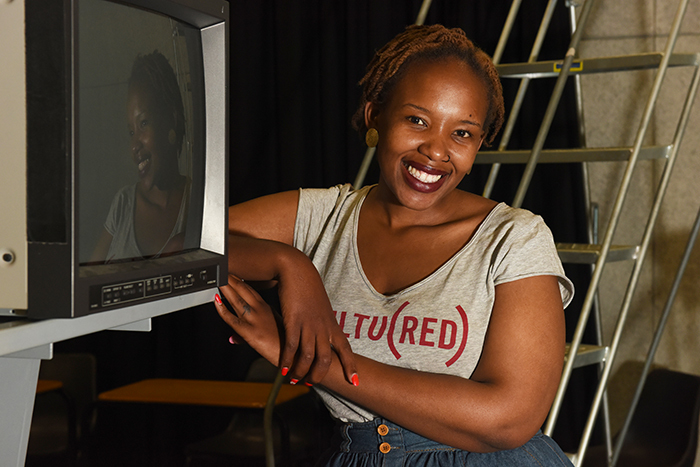Lobola and love: a film-maker's journey
21 September 2016 | Story by Newsroom
Sihle Hlophe knew precious little of the rich and complex lives of her Bantu ancestors, until she visited the ancient Kingdom of Mapungubwe.
Once there, she had an out-of-body experience that prompted her to begin telling the story of this concealed and multi-faceted history. She later learnt that such spiritual moments are not uncommon in this sacred place.
Hlophe aims to explore this narrative in her latest project, Lobola: A Bride's True Price, which she is developing as one of the recently announced Institute for Creative Arts (ICA) fellows at UCT.
The documentary chronicles the history of the Bantu people, who have traded at Mapungubwe since the Iron Age.
Begun as a historical documentary, she was concerned that the piece wouldn't resonate with those she wanted to reach. So she decided to use lobola as a means to focus and explore the traditional within a modern context.
While combining a traditional documentary style with personal video diaries and stop-frame animation, the documentary will be delivered in the vibrantly coloured and fast-paced visuals of the new “see Africa in a different way” aesthetic as she sees it.
Serving as preparation for Hlophe's own impending nuptials, the film will depict her personal discoveries of lobola, its history and the complexities and contradictions that come along with the long-standing practice.
“My marriage hinges on the documentary. So the longer I take to do the documentary, the longer it takes for me to get married,” she says.
Born a film-maker
Hlophe began a relationship with the screen as a young child. She loved film. And Steven Spielberg.
She is an artist, a storyteller, a lover of colour and of beautiful things.
“That's just who I am. I've always had a little camera clocking away, taking photos,” she says.
Partnered with a vibrant visual eye, her move to tell stories visually was organic. She came from a family of storytellers.
“My grandparents were authors and so I thought, I come from this family where there are so many stories, but I don't see my people on TV 'cause I speak a minority language, siSwati,” she explains. “So somehow I felt like it was my duty to take all of these amazing stories and let people see them.”
Voices on the peripheries
“I'm very passionate about the politics of representation and I'm also very passionate about hearing voices on the peripheries. And I believe I'm one of those voices,” she says.
Speaking to and advocating for the marginalised voices on the peripheries is Hlophe's mission as a film-maker.
She has been consistent in her promotion of minority languages such as siSwati in her films. Her most recent project, Nomfundo, was filmed entirely in siSwati. This was hugely challenging, given that the majority of actors and actresses are isiXhosa or isiZulu speaking.
But Hlophe maintains that it is vital to see yourself in popular media. Growing up in an all-white school, and drowned in films starring Reese Witherspoon and Cameron Diaz, even the realisation that there had been curvy women such as Marilyn Monroe in film was mind-altering for her.
“When you see people who look like you on screen – it reaffirms you,” she says.
Documentaries empower you
“What I like about documentaries is you have agency. You can do it now. You just need to grab a camera and get your story,” says Hlophe.
Often there is no time to sit on a story, she says. If something is happening now, it is important to be able to act. Waiting on funding for proposals is simply not an option.
“So that's what I mean by agency and that's so important for us as film-makers, because I think that's how we lose the fire: the waiting game, the rejection. Documentaries empower you.”
A pan-Africanist feminist
But her current project has presented a multitude of challenges.
As both a pan-Africanist and a feminist, Hlophe experiences an uncomfortable polarity.
“So there are times when I have to say: 'I like this about this ritual and I don't like that because it is patriarchal,' or 'I am a feminist, so I am not going to do that.' But I am also a pan-Africanist. So you're torn because you have this duality. You are African living in a Western context. But culture evolves,” she says.
While maintaining that it is important not to trivialise and dismiss traditions such as lobola, Hlophe is also unwilling to accept cultural practices that are often rooted in patriarchy.
As beautiful as she finds the meeting of ancestors during lobola, she is highly aware of the commodification of women's worth that occurs during the process, the marked absence of women in the negotiation process and the transactional nature of the event.
“In our mission to stick it to the West, you can find yourself perpetuating the very same things that you say you're fighting,” she explains.
Although she is finding herself all the more conflicted as she continues in her research, Hlophe thinks there may be certain aspects of lobola that she may go along with.
“The only reason we partake in rituals like marriage and bride price is largely to get respect from our families,” she says.
In making this documentary, Hlophe hopes that women, such as herself, who get proposed to, will not merely go along with traditions such as lobola without thinking about what they are doing, what they are perpetuating and why.
Story Kate-Lyn Moore. Photo Michael Hammond.
 This work is licensed under a Creative Commons Attribution-NoDerivatives 4.0 International License.
This work is licensed under a Creative Commons Attribution-NoDerivatives 4.0 International License.
Please view the republishing articles page for more information.










